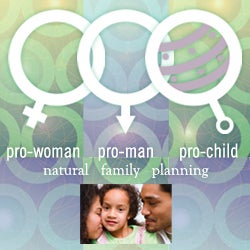
NFP Awareness Week
Did you know that this week, July 21-27, is Natural Family Planning (NFP) Awareness Week? The USCCB has dedicated this week to promote awareness of NFP. Many (if not most) Catholics do not properly know what NFP is and very few Catholics practice it. The USCCB should be lauded for attempting to promote awareness, unfortunately the timing is horrible since all of the media attention – including the Catholic media – is rightly focused on World Youth Day.
What is NFP?
Pope John Paul II: Evangelium Vitae
In his encyclical letter Evangelium Vitae (The Gospel of Life), Pope John Paul II outlined the appropriateness of NFP:At the first stage of life, centers for natural methods of regulating fertility should be promoted as a valuable help to responsible parenthood, in which all individuals, and in the first place the child, are recognized and respected in their own right and where every decision is guided by the ideal of the sincere gift of self. (EV, #88)
From the scientific point of view, these methods are becoming more and more accurate and make it possible in practice to make choices in harmony with moral values. An honest appraisal of their effectiveness should dispel certain prejudices which are still widely held, and should convince married couples, as well as health-care and social workers, of the importance of proper training in this area. (EV, #97)
What the Catechism Teaches
The Catechism articulates the Church teaching on family planning. Additionally it sets forth the proper disposition for discerning when to regulate procreation.
2368 A particular aspect of this responsibility concerns the regulation of procreation. For just reasons, spouses may wish to space the births of their children. It is their duty to make certain that their desire is not motivated by selfishness but is in conformity with the generosity appropriate to responsible parenthood. Moreover, they should conform their behavior to the objective criteria of morality:When it is a question of harmonizing married love with the responsible transmission of life, the morality of the behavior does not depend on sincere intention and evaluation of motives alone; but it must be determined by objective criteria, criteria drawn from the nature of the person and his acts criteria that respect the total meaning of mutual self-giving and human procreation in the context of true love; this is possible only if the virtue of married chastity is practiced with sincerity of heart. (NOTE: CCC cites GS 51 § 3 as an endnote).
2370 Periodic continence, that is, the methods of birth regulation based on self-observation and the use of infertile periods, is in conformity with the objective criteria of morality.158 These methods respect the bodies of the spouses, encourage tenderness between them, and favor the education of an authentic freedom. In contrast, "every action which, whether in anticipation of the conjugal act, or in its accomplishment, or in the development of its natural consequences, proposes, whether as an end or as a means, to render procreation impossible" is intrinsically evil:159 Thus the innate language that expresses the total reciprocal self-giving of husband and wife is overlaid, through contraception, by an objectively contradictory language, namely, that of not giving oneself totally to the other. This leads not only to a positive refusal to be open to life but also to a falsification of the inner truth of conjugal love, which is called upon to give itself in personal totality. ... The difference, both anthropological and moral, between contraception and recourse to the rhythm of the cycle ... involves in the final analysis two irreconcilable concepts of the human person and of human sexuality. (NOTE: CCC cites HV, 16; HV, 14; FC, 32 as endnotes).Links to Documents Cited in CCC:
- Gaudium et Spes (GS)
- Humanae Vitae (HV)
- Familiaris Consortio (FC)

No comments:
Post a Comment